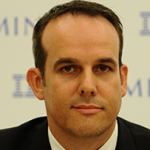Recent history has not been kind to ModusLink Global Services. Dependent on a small number of large, key clients, the global supply chain and logistics services company has experienced two years of operating losses, while revenue has been on a mostly downward track for several years. That didn’t deter Neil Hampshire from signing on as CIO this past September to try and help turn that trajectory.
“What the business is recognizing is that increasingly supply chains are as much about moving data and systems as they are about moving boxes and making products,” says Hampshire, who brings 25 years of experience with senior positions at RB (formerly Reckitt Benckiser), Avon, The Minor Group, Wrigley Jr. Co. and Gillette.
Managing transformation
Hampshire joined a reconfigured management team that includes a new chief of operations, chief finance officer, as well as CEO John Boucher. “There’s a great new senior management team here and they are genuinely looking at IT to help build new capabilities, to create new services and new channels of business for them,” he says. “IT has a role here to lead and to the future of the company, which is quite exciting.”
Forbes contributor Gil Press recently sorted through the 2016 predictions of technology market research firms Forrester Research, Gartner and IDC to assess the extent of the digital transformation trend. “By 2018, 67 percent of the CEOs of Global 2000 enterprises will have digital transformation at the center of their corporate strategy,” he writes.
CMGI offspring
Such transformation should run in the veins of ModusLink. The company formed in 2004 with the acquisition of 20-year-old supply chain specialist Modus Media by former Internet ventures incubator CMGI. CMGI had invested in or acquired a series of high-flying startups including Lycos and AltaVista, among others.
At that time, CMGI’s SalesLink and Modus Media combined for revenue of more than $1 billion. By the end of fiscal year 2015 it had declined to $561.7 million, which the company says also reflects streamlining and the shedding of less profitable revenue streams.
Casting out one-off solutions
In the past, says Hampshire, ModusLink’s earned a reputation for flexibility and quick response, but it came at the expense of creating “one-off solutions” for clients. Now the focus is on using technology to create a standard and cost-efficient backend while offering customers a highly customizable, flexible front end, he says.
As a data-driven organization, ModusLink has the opportunity to use its data to help customers “drive revenue as well as execute the physical order shipment and ecommerce transactions,” Hampshire says. That will require putting IT in front of customers to support the sales process, but they’ll need “the right level of soft skills” in order to take on that role.
It’s also important for IT to avoid getting caught up in topical buzzwords like cloud and big data and instead focus “on what it really means for the business, rather than the hype and the excitement. Understanding how cloud plays in this space to give you flexibility and a more scalable environment is hugely important, but the business just wants to know what it does for them.”





